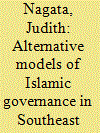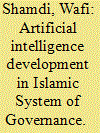|
|
|
Sort Order |
|
|
|
Items / Page
|
|
|
|
|
|
|
| Srl | Item |
| 1 |
ID:
052488


|
|
|
|
|
| Publication |
June 2004.
|
| Summary/Abstract |
In the prevailing political world order, sovereign nation-states and secular political authority widely face competition from transnational religious communities, whose authority and agendas derive from different principles. This is particularly evident in Islam, where ulama may acquire political power, while governments appropriate religious interpretations to their own purposes, and even determine who is orthodox or heretical in their domain. This article focuses on the origins and spread of one Malay Islamic movement, Al Arqam, inspired by a rare mix of global Sufi and strict Shari'ah traditions, many of whose members were organized into residential communes and institutions promoting economic independence, mutual support, social service and extensive mission. With their schools, clinics, farms and factories, this amounted to an experiment in alternative development and governance, although not explicitly as an Islamic state. Arqam's moral example and its success in recruiting technically skilled, highly educated young Malays, however, was perceived by the Malaysian government, as its own loss, and a threat to its legitimacy, and the movement was eventually banned. Through this non-violent ideological confrontation, Arqam became de facto political, as well as a 'heresy', in this local understanding of 'political Islam'.
|
|
|
|
|
|
|
|
|
|
|
|
|
|
|
|
| 2 |
ID:
188971


|
|
|
|
|
| Summary/Abstract |
The applications of artificial intelligence (AI) in our daily activities have helped us accomplish our tasks more effectively and efficiently. With the advancement of computing power and the Internet, AI systems have been applied in many areas such as business, management, and health. This paper analysed the possibility of integrating AI into the Islamic System of Governance (ISG). This research utilised Amin’s ISG, which provides a set of analytical frameworks for gearing relevant organisations towards achieving their objectives. The ISG was derived from the Prophetic Madinian Polity and thus adopted elements of the polity. For instance, the ISG set the Maqāsid of the Sharī’ah as an organisation’s strategic objectives and constructed the Islamic Governance operational framework with four components from elements of the polity: (1) Tauhid, (2) Juristic, (3) Values, and (4) Cultural. A comprehensive literature review was conducted to look into the integration of AI with this ISG. The research findings indicated that there is not much research conducted in this area. Therefore, we explore the potential of applying AI in the context of an ISG. Several researches have investigated the integration of AI into some of the ISG components like the Juristic, Values, and Cultural, in other areas and contexts. However, none of them is completely suitable for the ISG context. Furthermore, none of the research was done as an integrated whole, thus, ignoring the relational dynamic between the components of ISG. Hence, a more comprehensive study is required to fill the gap in deploying AI with the ISG.
|
|
|
|
|
|
|
|
|
|
|
|
|
|
|
|
| 3 |
ID:
052489


|
|
|
|
|
| Publication |
June 2004.
|
| Summary/Abstract |
This article suggests that there is much to be learnt from studying Islam in Malaysia and Indonesia comparatively to trace their emerging similarities. Various models of an Islamic state, be it by directly involving the shariah as the only source of reference, as it is proposed Parti Islam SeMalaysia (PAS), or by gradually Islamizing the society (shariah haraki), a model that has been applied with considerable success by both ABIM and the Mahathir administration and receives backing from Islamic mass organizations such as the NU and Muhammadiyah. This suggests that there is a gradual transformation of the Wahhabi-inspired dakwah-Islam of the late 1970s into new discourses of Islamic civil society undertaken by the emerging middle classes of both countries. However, Wahhabi-Islam is nevertheless still important and its impact on the future shape of political Islam in the region cannot be underestimated, especially since dakwah-organizations link up internationally and continue to be generously sponsored by Saudi Arabia.
|
|
|
|
|
|
|
|
|
|
|
|
|
|
|
|
| 4 |
ID:
145682


|
|
|
|
|
| Summary/Abstract |
Brunei and Malaysia are promoting the ASEAN Human Rights Declaration but enforce a brand of Islamic law that systematically violates it. The paradoxical ways in which policymakers are navigating between the two, and the empirical realities of Islamic governance, impede the project of a transdoctrinal justification of human rights.
|
|
|
|
|
|
|
|
|
|
|
|
|
|
|
|
|
|
|
|
|